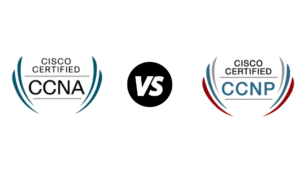Introduction of Network Certification
Network certification is available from Cisco at five different levels: Entry, Associate, Professional, Expert, and Architect. Installing, maintaining, troubleshooting, and implementing fundamental network security procedures are all tasks performed by Cisco-certified specialists. In addition, they might oversee the creation of enterprise network architecture, evaluate market trends, and make technological and product choices.
According to some, obtaining a Cisco certification can validate and improve your networking expertise, lead to new employment prospects, raise your compensation, and increase your employability.
This blog aims to clarify the difference between the CCNP and CCNA certification. We have included a keen amount of knowledge in this blog where you will get a clarification of each aspect of both of these certifications. Hope after reading this blog you will get clear all differences between the CCNA and CCNP certifications.
A few Cisco Certifications are as follows
Here we mention two main Cisco certifications; kindly go through them.

Cisco Certified Network Associate (CCNA)
The knowledge of IP connectivity, IP services, networking principles, and security principles is demonstrated by this certification. Dial access, WAN, and LAN services can be installed, configured, and run by CCNA-certified specialists.
Routing and switching, security, cloud, collaboration, cyber operations, design, data center technologies, service providers, and industrial plants are among the nine categories of CCNA certificates.
Cisco Certification Network Professional (CCNP)
The Cisco Certified Network Professional credential is known as CCNP. IT workers with at least a year of experience in professional networking are eligible for this certification. Additionally required is a high school diploma or its equivalent.
Professionals looking for specialized training programs in the implementation, upkeep, and planning of Cisco’s extensive portfolio of high-end network solution products are the target audience for the CCNP certification.
Overview of CCNA and CCNP
Let’s have a quick overview of CCNA and CCNP:
Meaning of CCNA
The Cisco Certified Network Associate (CCNA) certification is a foundational IT credential offered by Cisco Systems. It is regarded as a prerequisite for employment in networking and IT and is meant to verify an understanding of networking concepts, which are frequently needed for IT roles. Topics including network basics, network access, IP connection, IP services, security fundamentals, automation and programmability, and more are covered in the 120-minute CCNA test.
Networking jobs such as network engineer, network administrator, and network expert can be prepared for with the CCNA. These positions often involve planning, creating, and putting into place computer networks and systems. For instance, network security experts evaluate threats, put security measures into place, and keep an eye out for security flaws and unauthorized users on networks.
Focus and Objectives of CCNA
An entry-level IT certification that qualifies candidates for networking positions such as network administrator, network engineer, and network specialist is the Cisco Certified Network Associate (CCNA) certification. The certification covers basic networking concepts as well as the operation of switches, routers, and repeaters. It focuses on monitoring, administering, and maintaining network foundations. Network foundations, routing and switching, security, wireless networking, automation and programmability, and other key competencies for IT and networking workers are all validated by the well-renowned CCNA certification.
The 120-minute CCNA exam is available in both Japanese and English. A combination of lectures, presentations, demonstrations, interactive debates, and practical experience make up the curriculum.
No matter what a recipient decides to focus on in the future, the CCNA certification is a valuable asset for any Cisco-based professional path. Additionally, it might demonstrate to companies that you possess the abilities required to meet market expectations. Recertifying can be an effective approach to confirm your knowledge and make sure you are current with the training, as Cisco regularly analyses its certifications to make sure they are keeping up with IT standards.
Meaning of CCNP
Cisco Certified Network Professional is referred to as CCNP. This credential offers preparation for networking certifications at the professional and enterprise levels.
- Enterprise: Acquire the knowledge to set up, diagnose, and oversee networks for major businesses.
- Service Provider: Show that you are knowledgeable about putting basic SDN technologies—like automation, architecture, networking, and services—into practice.
- Security: Demonstrate your ability to develop and implement network security, user and device security, cloud security architecture, and more.
- Collaboration: Verify your proficiency with putting key collaborative technologies—like endpoints, apps, infrastructure, protocols, and design—into practice.
Focus and Objectives of CCNP
Obtaining a CCNP Enterprise certification attests to your capacity to manage and expand business networks in response to expanding needs. Present your knowledge of virtualization, assurance, security, automation, and corporate infrastructure to hiring managers.
The significance of CCNP Enterprise Certification. The ability to debug, verify, implement, plan, and work with experts on wireless, voice, video, and advanced security solutions is validated by the Cisco Certified Network Professional (CCNP) Enterprise certification.
Importance of CCNA and CCNP
Do you know the importance of CCNA and CCNP in networking careers? If not then kindly read it here:
CCNP: The significance of CCNP Enterprise Certification. The Cisco Certified Network Professional (CCNP) Enterprise credential attests to one’s capacity for troubleshooting, verifying, implementing, and planning both local and wide-area enterprise networks. It also fosters cooperation with experts in the fields of advanced security, wireless, voice, and video solutions.
CCNA: Gaining new opportunities in the industry and improving your professional prospects are made possible by earning the CCNA certification. Network foundations, sophisticated routing and switching, security, and wireless networking are just a few of the topics it covers. You have the foundational knowledge and abilities needed to progress in your job.
In a competitive job market, having a CCNA certification gives you a clear advantage over other candidates who might not have formal networking qualifications. A CCNA is recognized by employers as a badge of skill and dedication, which makes you a desirable candidate for networking roles.
CCNA and CCNP Certification Levels
Do you know the certification levels of CCNA and CCNP? Let’s move further and have a knowledge about it:
CCNA Certifications- Entry-Level Certification
The networking hardware manufacturer Cisco offers an entry-level information technology (IT) certification called the CCNA, or Cisco Certified Network Associate. The purpose of the CCNA is to verify your understanding of core networking principles, which are frequently needed for networking tasks in IT jobs.
CCNP Certification- Professional-Level Certification
Candidates for the Cisco Certified Network Professional program are trained in the design, implementation, verification, and troubleshooting of enterprise-level Local Area Networks (LAN) and Wide Area Networks (WAN). Professionals with CCNP certifications can work well with experts in advanced security, wireless, video, and voice solutions. Network administrators, engineers, technicians, and systems engineers are just a few of the enterprise-level networking positions in which Cisco Certified Network Professionals can succeed.
CCNA and CCNP Exam Structure
Now, here we have discussed the CCNA and CCNP exam structure:
CCNA Exam Details
To become certified, CCNA candidates need to pass the Cisco 200-301 CCNA test. Networking essentials, including the newest technologies, software development abilities, and professional duties, are covered in the exam. If one passes it, it indicates that one is familiar with the fundamentals of managing a network.
CCNP Exam Details
Unlike in the past, you no longer need to be CCNA certified to sit for the CCNP exam, though having foundational knowledge helps. For CCNP certification, candidates now need to pass two exams:
- 300-410 ENARSI: Implementing Cisco Enterprise Advanced Routing and Services
- 420 ENSLD: Designing Cisco Enterprise Networks
CCNA and CCNP Career Differences
The CCNA and CCNP certifications lead to distinct career pathways due to their differing training levels.
CCNA Career Path
For those wishing to pursue an entry-level position, this qualification is most appropriate for:
- Network Support Engineer
- Network Technician
- Helpdesk Engineer
- Service Desk Engineer/Technician
- First and Second Line Support
CCNP Career Path
IT workers who wish to advance in their careers might consider obtaining the CCNP certification, which can lead to the following opportunities:
- Third Line Support
- Network Engineer
- Network Analyst
- IT Team Leader
- Systems Engineer
- Network Specialist
Exam Difficulty in CCNA and CCNP
Those who want to become certified as CCNAs or CCNPs need to pass an exam. Depending on the applicant’s experience and knowledge level, these tests can range in difficulty. That being said, the CCNA test is generally thought to be simpler than the CCNP exam.
The fact that the CCNA test covers a narrower range of subjects than the CCNP exam could be one factor contributing to its perceived ease. More complex topics like IP routing and network security are covered in the CCNP test. Therefore, the CCNA exam might be simpler for applicants who are already aware of these subjects.
The fact that the CCNA exam permits candidates to use a simulator throughout the test is another factor that could make it simpler. Candidates can learn about numerous networking principles and become acquainted with the Cisco IOS with the aid of this simulator. In contrast, using a simulator is not permitted for the CCNP exam.
The overall complexity of the CCNA and CCNP tests varies depending on the candidate’s background knowledge and experience. It might be simpler for people who are already familiar with the subjects covered in the CCNA exam than for those who are not. Furthermore, some students may find the CCNA exam simpler if they utilize a simulator.
CCNA and CCNP Comparison Table
| Basis | CCNA | CCNP |
| Average annual U.S. salary for certified individuals | $102,500 | $75,000 |
| Professional paths |
Network Specialist Systems Engineer Third Line Support Network Engineer |
Helpdesk Engineer Network Technician Network Support Engineer First and Second Line Support |
| Prerequisite | A high school certificate or an equivalent is required | None |
| Type of exams | Core exam: 350-401 ENCOR, Concentration Exam (two exams in total) | One Exam (200-301) |
| Exam fees | $300 for Concentration Exam, $400 for Core Exam | $300 |
| Recertification | 3 Years | 3 Years |
Conclusion
In conclusion, understanding the distinctions between CCNA and CCNP certifications is critical for anyone pursuing a career in Cisco networking. Both certifications play important roles in verifying abilities and increasing employability in the IT business. CCNA is an entry-level Cisco IT certification that provides applicants with basic networking expertise, equipping them for a variety of entry-level employment. CCNP, on the other hand, is a professional-level Cisco IT certification designed for those who want to expand their knowledge and improve their careers in more specialized jobs.
Understanding the distinctions between CCNA and CCNP is critical, particularly when considering Cisco examinations because each certification necessitates a different level of knowledge and experience. While CCNA emphasizes core principles, CCNP digs into more sophisticated topics, making it a more difficult Cisco test. Both credentials require renewal every three years to ensure that professionals keep up with evolving technologies.
By enrolling in Cisco IT certification, candidates not only prove their talents but also gain access to lucrative networking opportunities. Whether you choose to begin your journey with CCNA or advance your career with CCNP, both courses lead to important Cisco networking experience, allowing you to compete in the competitive IT landscape. Stay watch for future articles to learn more about Cisco IT certification and the pathways accessible through CCNA and CCNP.





